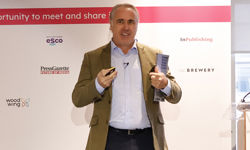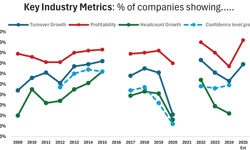There have been a few changes at Tom’s company over the past few years. In 2011, three companies (BBC Magazines, Origin Publishing and Magicalia) merged to form Immediate Media. Since then, the workforce has had to cope with: new branding, new identity, a 45% increase in headcount (including growing the digital team from 40 to 170 people), 15 print launches, 50 digital launches and a fundamental change in philosophy. The company no longer sees itself as a magazine publisher, but as a “special interest content and platform company”.
Throw in an office move, and that’s a lot of upheaval.
As the media world evolves, publishing companies of all shapes and sizes have to embrace change. What then is the secret to getting it right?
The challenge, says Tom Bureau, is “to get people to move at pace, collaborate and create real momentum. When your people wake up in the morning, do they want to come to work? That is the heart of the matter.”
If they do, then you’re half way there; if they don’t, then you’ve got a big problem. Having a motivated workforce is not a nice-to-have, he said, but a clear competitive advantage. “If you’re a people business, then you have to invest in people.”
Tom had a number of best practice tips:
1. Secure buy-in from your staff.
“Everyone needs to know where the business is going,” he said. “They need to be able to articulate the vision. If you don’t have that, then there is no emotional connection.”
Immediate Media fosters an open and transparent culture. There are cross company meetings and, every quarter, everyone is shown the financial results.
If people are resistant, then they are given a choice: embrace our vision or, please, go and ply your trade somewhere else.
No faffing about on staffing issues is a key element in forcing through change, fast.
2. Invest in training.
Investing in HR development is crucial. “We want our staff to be excited about work – it’s never about the money; it’s about learning and development.” A particular focus at Immediate is the ‘integral leaders programme’ whereby managers are trained to “change their behaviours, to learn emotional intelligence and to improve their communication skills”.
3. Focus on recruitment.
The best way to get a motivated workforce, says Tom, is to… recruit motivated people. Who said anything about rocket science. The key is not so much spotting relevant skill sets in applicants (that’s the easy bit) but rather looking for the right cultural and attitudinal fit. To that end, Immediate doesn’t go in for psychometric tests and the like, but instead makes sure they have top class, well trained recruiters who can spot motivated people.
4. Breakdown old hierarchical structures.
The old command and control approach has got to go and publishers should strive to make their management structures as flat as possible. It’s all about teams and encouraging entrepreneurial behaviour. Media companies have to be ideas factories, said Tom.
5. Get the workspace right.
Getting the workplace right is another key component. Immediate Media’s new offices in Hammersmith were purpose built and the company invested heavily to build an open and collaborative environment. The architect’s brief was to create a “breeding ground for cutting-edge cross-platform ideas”. (You can see what this means in practice in this gallery of the Immediate Media offices.)
6. Celebrate success.
Last, but not least, the company goes out of its way to celebrate success and say ‘thank you’ to its staff. Amongst other things, each year, the company organises the IM Festival, a company-wide jolly where all 1,100 staff are whisked away for the weekend. Sounds fun.
So, does it all work? Immediate Media was named Media Company of the Year at this year’s British Media Awards. The judges said they were impressed by the clarity of Immediate Media’s strategy, its consistent growth across all platforms, its hiring of only the best people and its good commercial reach. So, that’s a yes.
Immediate Media certainly seems like a busy and invigorating place to work, but as I packed away my notepad, I couldn’t help pondering on Tom’s comments about staff retention. It’s not about the money, it’s about job satisfaction. Mmmm. It’s a well articulated view and one heard frequently at industry conferences. But, off the top of my head, I struggled to recall when I last heard it from someone who wasn’t a highly paid CEO. Ho-hum.












